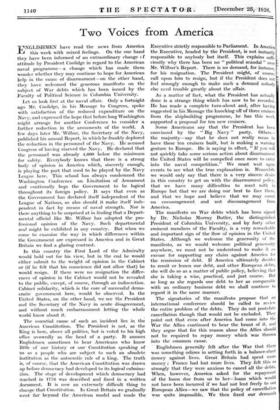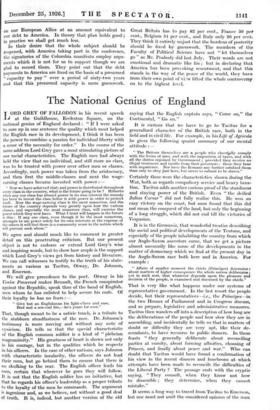Two Voices from America
ENGLISHMEN have read the news from America this week with mixed feelings. On the one -hand they have been informed of an extraordinary change cf attitude by President Coolidge in regard to the American naval programme—a change which has made them wonder whether they may continue to hope for American help in the cause of disarmament—on the other hand, they have welcomed the generous manifesto on the subject of War debts which has been issued by the Faculty of Political Science in Columbia University.
Let us look first at the naval affair. Only a fortnight ago Mr. Coolidge, in his Message to Congress, spoke with satisfaction of the reduced expenditure on the Navy, and expressed the hope that before long Washington might arrange for another Conference to consider a further reduction in the armaments of the world. A few days later Mr. `Wilbur, the Secretary of the Navy, published his annual Report, in which he frankly deplored the reduction in the personnel of the Navy. He accused Congress of having starved the Navy. He declared that the personnel was already 4,000 below the minimum for safety. Everybody knows that there is a strong body of opinion in America which, sincerely enough, is playing the part that used to be played by the Navy League here. This school has always condemned the Washington Conference on Limitation of Armament and continually begs the Government to be logical throughout its foreign policy. It says that even as the Government has declared itself independent of the League of Nations, so also should it make itself inde- pendent in fact by means of naval strength. Nor is there anything to be surprised at in finding that a Depart- mental official like Mr. Wilbur has adopted the pro- fessional opinion of the Navy. Such departmental zeal might be exhibited in any country. But when we come to examine the way in which differences within the Government are expressed in America and in Great Britain we find a glaring contrast.
In this country the First Lord, of the Admiralty would hold out for his view, but in the end he would either submit to the weight of opinion in the Cabinet or (if he felt that his conscience did not allow that) he would resign. If there were no resignation the differ- ences of opinion in the Cabinet would not be revealed to the public, except, of course, through an indiscretion. Cabinet solidarity, which is the core of successful demo- cratic government here, would be observed. In the United States, on the other hand, we see the President and the Secretary of the Navy in acute disagreement, and without much embarrassment letting the whole world know about it.
The essential cause of_ such an incident lies in the American Constitution. The President is not, as the King is here, above all politics, but is voted to his high office avowedly as the head of a party. It amuses Englishmen sometimes to hear Americans who know little of our history or our Constitution speaking of us as a people who are subject to such an obsolete institution as the autocratic rule of a king. The truth is, of course, that the American Constitution was drawn up before democracy had developed-to its logical culmina- tion. The stage of development which democracy had reached in 1776 was described and fixed' in a written document. It is now an extremely difficult thing to change that Constitution. In Great Britain we gradually went .far beyond the- American model and made the Executive strictly responsible to Parliament. In America the Executive, headed by the President, is not instantly responsible to anybody but itself. This explains suffi. ciently why there has been no " political scandal " ovet Mr. Wilbur's Report. There is no demand, for instance, for his resignation. The President Might, of course, call upon him to resign, but' if the President*does not feel strongly enough to Make such a. demand nobody else need trouble greatly about the affair.
As a matter of fact, what the. President has actually done is a .strange thing which' has now to be recorded. He has made a complete turn-about and, after having suggested in his Message the knocking off of three cruisers from the shipbuilding programme, he has this week supported a proposal for ten new cruisers.
Some Americans say that the President has been convinced by the " Big Navy " party. Others–. the majority—say that he does not really mean to have these ten cruisers built, but is making a warning gesture to Europe. He is saying in effect, " If you will not quickly take some serious action about disarmament the United States will be compelled once more to enter into the naval competition." We must wait upon events to see what the true explanation is. Meanwhile we would only say that there is a very sincere desire in this country to get on with the disarmament policy, that we have many difficulties to meet with in Europe but that we are doing our best to face them, and that we hope and believe that we may count on encouragement and not discouragement from America.
The manifesto on War debts which has been signed by Dr. Nicholas Murray Butler; the -distinguished President of Columbia University, and by forty other eminent members of the Faculty, is a very remarkable and important sign of the flow of opinion in the United States. Although we welcome the generosity of the manifesto, as we would welcome political generosity anywhere, we must not be understood to make it an excuse for supporting any claim against America for the remission of debt. If America ultimately decides to remit or lessen our debt, and other European debts, she will do so as a matter of public policy, believing that she is taking a wise, practical, and just course. But so long as she regards our debt to her as comparable with an ordinary business debt we shall continue to regard it in the same manner.- The signatories of the manifesto propose that an international conference should be called to review the entire problem of the debts. They do not postulate cancellation though that would not be excluded. They point out that even after America had come into the War the Allies -continued to -bear the brunt of it, and they argue that for this reason alone the Allies should not be required to repay' money which was - thrown into the common cause.
Englishmen generally felt after the War that there was "something odiOus in setting forth m a balance-sheet Money against . lives. Great. Britain had. spent more money ; France had lost more lives. TheY felt .this so ro stngly that they 'were anxious to cancel all the debts. When, however,- America- asked for the repayment of the loans -dile from us to which would not have been incurred if we had.not lent freely to out European Allies—we saw that the policy of cancellation was quite iinpossible. We then fixed our demands on our European Allies at an amount equivalent to our debt to America. In theory that plan holds good ; in practice we shall get much less.
in their desire that the whole subject should be reopened, with America taking part in the conference, the signatories of the Columbia manifesto employ argu- ments which it is not for us to support though we are glad to record them. They point out that the debt payments to America, are fixed on the basis of a presumed " capacity to pay " over a period of sixty-two years and that this, presumed capacity • is mere guesswork. Great Britain has to pay 82 per cent., France 50 per cent, Belgium 54 per cent., and Italy only 26 per cent. They think it entirely unjust that the burdens of posterity should be fixed by guesswork. The members of the Faculty of Political Science have not "let themselves go ". as Mr. Peabody did last July. Their words are not emotional and dramatic like his ; but in declaring that America has been provoking resentment, and that this stands in the .way of the peace of the world, they have from their own point of vi w lifted the whole controversy on to the highest level.



































 Previous page
Previous page